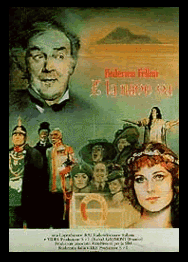

Color, 1984, 127 mins. / Directed by Federico Fellini / Starring Freddie Jones, Barbara Jefford, Victor Poletti, Peter Cellier, Elisa Mainardi, Norma West, Sarah-Jane Varley, Janet Suzman / Music by Gianfranco Plenizio / Produced by Franco Cristaldi / Cinematography by Giuseppe Rotunno Format: DVD - Criterion (MSRP $29.95) / Letterboxed (1.78:1) / Dolby Digital Mono
B&W, 1957, 118 mins. / Directed by Federico Fellini / Starring Giulietta Masina, François Périer, Franca Marzi, Dorian Gray, Aldo Silvani / Music by Nino Rota / Produced by Dino De Laurentiis / Cinematography by Aldo Tonti Format: DVD - Criterion (MSRP $39.95) / Full Frame / Dolby Digital Mono
Probably because it features few of his recognizable standard performers nor the requisite Nino Rota music score, Fellini's E la Nave Va (And the Ship Sails On) has never enjoyed a reputation equal to most of his earlier films. However, on both technical and artist levels, the film is easily as good some of the more famous films from his "excessive" period (Satyricon, Casanova, City of Women, etc.), and foreign film addicts would do well to discover this unheralded little gem.
In the summer of 1914, a luxury liner (filmed completely on the soundstages of Cinecitta!) departs from the Italian coast. The passengers on board have all congregated with one mission in mind: to pay tribute and scatter the ashes of Tetua, a revered opera diva. The events are presented for the audience through the eyes of Orlando (David Lynch favorite Freddie Jones), a gregarious reporter who spends most of his time addressing the camera. This delirious ship of exotic fools revels in lavish banquets, self indulgent soirees, and other idle dalliances of the rich.
 Their chic self absorption begins to crack when the captain rescues a band of Serbian refugees who have been set adrift to escape the imminent terror of World War I. As the passengers soon realize, even in the middle of the ocean, you cannot escape reality.
Their chic self absorption begins to crack when the captain rescues a band of Serbian refugees who have been set adrift to escape the imminent terror of World War I. As the passengers soon realize, even in the middle of the ocean, you cannot escape reality.
One of Fellini's most visually sumptuous efforts, And the Ship Sails On basks in its own glorious artifice. Characters often make ironic remarks while staring at the ultra-saturated backdrops ("Look at that sunset -- it almost appears to be painted on!") and change costumes more often than their expressions. Like most Fellini films, this film was shot without sound and later dubbed in due to the motley international players (Jones' dubbing is especially distracting), but the Italian version is as authentic as any. The opening sequence ranks as one of the most audacious of Fellini's many cinematic feats; the film begins as a silent, sepia-toned depiction of the ship's preparations before departure, with sound effects gradually layered on as the passengers begin to arrive. One by one the actors begin to sing, with Plenizio's operatic works continuing to appear throughout the film as musical accompaniment. Upon the arrival of the ashes, the film bursts into color -- and the voyage begins. Without giving anything away, the finale is perhaps even more audacious and reminiscent of 8 1/2 in its puckish cinematic trickery.
Criterion's edition of And the Ship Sails On clocks in at just over 127 minutes, though versions running as long as 134 minutes have been reported in Europe. Whether this discrepancy is due to Fellini's last minute trims (not an uncommon occurrence) or the variances of converting European video for the U.S. is uncertain, but the film doesn't appear to be missing anything significant. The image quality is very good, especially considering the condition of most pre-1990 Italian films, though not as dazzling and clear as Nights of Cabiria. The easily legible English subtitles are optional and usually very accurate. No extras aside from a fold out booklet with excerpts from the book, I, Fellini. Amazingly, this disc is not time encoded, a trend Criterion will hopefully discontinue in the future.

While America was celebrating its insulated world of the nuclear family and flag-waving in the 1950s, foreign cinema gradually slipped into public consciousness and exposed viewers to some visions that wouldn't be seen coming out of Hollywood until the late '60s at best. One of the pioneers in this field, Federico Fellini, took the post-World War II concept of neorealism and gave it his own unique twist, and of all of his films, perhaps Nights of Cabiria (Le Notti di Cabiria) was the most ahead of its time. Here is a film with an individualistic female protagonist in a world where - gasp! - most of the men are jerks, she doesn't experience a magical rescue a la Pretty Woman, and the only salvation comes through her own steadfast positive attitude. Rather than flinging one misery after another at his characters like such other neorealist films as Umberto D., Fellini displays admiration and concern for his heroine, most likely due in part to the fact that the role is played by his wife, Giulietta Masina. While Masina sometimes seemed hammy and miscast in her other films for her husband, here she's absolutely perfect and offers many startling non-verbal moments in which her gorgeous, soulful eyes communicate everything the audience needs to know. And what a glorious final shot!
The story of Cabiria should be familiar to anyone has seen its American musical stage version, Sweet Charity, which was later filmed (very well) with Shirley MacLaine. Most of the vignettes in the film lead to the perky prostitute Cabiria being tossed aside or attacked in some way, but Fellini counters this potentially downbeat material by introducing moments of quirky humor (Cabiria runs into a door, goes to an odd and utterly Fellini vaudeville show, etc.) and surprising pathos, thanks in no small part to Nino Rota's beautiful score. The DVD reinstates a seven minute sequence in which Cabiria encounters an impoverished former fellow hooker out in the country and returns to Rome with a nameless man carrying a sack. The scene is nicely acted but adds little to the film; according to the interview with producer De Laurentiis, he sliced the sequence from the film and stole it from Fellini, only to return it to the director several years later. The quality of the presentation here is immaculate, and any film students who have suffered through horrendous, washed-out, scratchy prints or public domain tapes will find this a completely new experience. While the sound still remains undeniably of its era, with a few shrill moments of dialogue, the audio is a radical improvement. Dialogue plays an especially important role here, as Fellini had up and coming filmmaker Pier Paolo Pasolini adapt the script into common street dialect. While Fellini usually shot without sound and dubbed the dialogue in later (see Satyricon for a particularly obvious example), Cabiria remains that rarity, an Italian film that really is in Italian. The new optional subtitles are consistently clear and accurate, while the new English dub track is surprisngly well done, with most of the characters sporting appropriate Italian accents. Criterion's satisfying package also includes an early Masina/Cabiria appearance from Fellini's The White Sheik (in noticeably rougher condition) and the original and U.S. reissue trailers. The price tag may seem a little steep, but anyone with a love for cinema and Fellini in particular should find this well worth it.